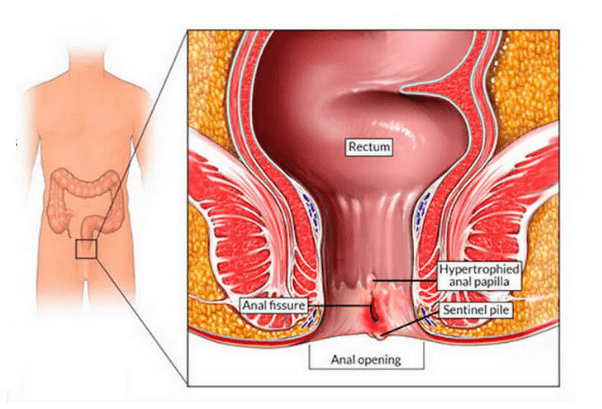Fistula
Understanding Fistula in Ano: Causes, Symptoms, Treatment, and Expert Care
A fistula in ano is a small tunnel that develops between the skin near the anus and the anal canal. This condition is often painful, can lead to recurring infections, and requires timely treatment to avoid complications. In this blog, we’ll explore what a fistula is, how it develops, its symptoms, the different grades, treatment options, and why Surgiplus Hospital in Nagpur, led by Dr. Pitambar Masram, is the best choice for treating fistula in ano.

What is Fistula in Ano?
A fistula in ano is an abnormal, small channel or passage that forms between the anal canal and the skin surrounding the anus. The condition often results from an infected anal gland that causes an abscess (a pocket of pus) in the rectum or anus. As the abscess heals, a fistula may develop, causing continuous discharge, irritation, and pain.
Fistulas are often associated with other conditions like Crohn’s disease, tuberculosis, or anal abscesses. It is important to diagnose and treat a fistula early to prevent further complications.
How Does a Fistula Develop?
Fistulas typically develop after an anal abscess. When an abscess (a pus-filled infection) forms in the anal glands, the body attempts to drain it. In some cases, the abscess does not heal completely and a passage, or tunnel, forms between the abscess and the skin surrounding the anus, resulting in a fistula.
Several factors contribute to the formation of an anal fistula:
- Infection in the anal glands: The most common cause.
- Chronic conditions: Like Crohn’s disease or tuberculosis.
- Trauma or injury to the anal region.
- Previous surgeries in the anal area, which can lead to infection and fistula formation.
What Are the Grades of Fistula in Ano?
Fistulas are classified into different grades based on their complexity and their relationship to the anal sphincter (the muscle that controls bowel movements). The grading helps guide the treatment approach:
- Grade 1 (Intersphincteric Fistula): The fistula is confined to the area between the two anal sphincter muscles and does not involve the external sphincter.
- Grade 2 (Trans-sphincteric Fistula): The fistula passes through one or both of the anal sphincter muscles, potentially causing difficulty with bowel control.
- Grade 3 (Suprasphincteric Fistula): The fistula tracks above the sphincter muscles and may involve the tissues above the anus.
- Grade 4 (Extrasphincteric Fistula): This is the most complex type, where the fistula passes through the sphincter muscle and continues to involve other tissues and organs, such as the perineum or pelvis.
What Are the Symptoms of Fistula in Ano?
The symptoms of a fistula in ano can vary depending on the severity of the condition, but the most common signs include:
- Pain and discomfort: Particularly when sitting or during bowel movements.
- Swelling and tenderness around the anus.
- Discharge of pus or blood from a small opening near the anus.
- Itching or irritation around the anal area.
- Recurrent abscesses in the anal region.
- Fever in some cases, especially if an abscess is present.
- Painful bowel movements due to irritation caused by the fistula.
If left untreated, fistulas can lead to chronic drainage, abscess formation, and persistent pain. Therefore, it’s crucial to seek medical advice if you experience any of these symptoms.

What is the Difference Between Simple and Complex Fistulas?
Fistulas can be classified as simple or complex depending on their anatomical location, the extent of involvement with the sphincter muscles, and the underlying causes.
- Simple Fistula: A simple fistula involves minimal sphincter involvement and does not affect other organs or tissues. These types of fistulas are usually easier to treat and may respond well to less invasive procedures.
- Complex Fistula: Complex fistulas involve a larger area of the anal sphincter muscles, extend into deeper tissues, or are associated with underlying conditions like Crohn’s disease. These are more difficult to treat and may require more advanced surgical procedures.
Treatment Modalities for Fistula in Ano
The treatment for fistula in ano depends on the type, complexity, and grade of the fistula. Treatment options include both non-surgical and surgical approaches:
- Conservative Treatments
- Antibiotics: To treat any associated infections or abscesses.
- Sitz Baths: Soaking in warm water may help relieve pain and discomfort.
- Stool Softener: To make bowel movements easier and reduce irritation.
- Surgical Treatment
The majority of fistulas require surgery to promote healing. Surgical options include:
- Fistulotomy: The most common surgery, where the fistula tract is cut open to allow it to heal from the inside out.
- Seton Placement: A seton is a soft surgical thread used to keep the fistula open, allowing for drainage. It helps with healing by preventing infection and promoting tissue growth.
- Advancement Flap Procedure: Used for complex fistulas, this involves covering the fistula tract with a flap of healthy tissue to close the tract.
- LIFT Procedure (Ligation of Intersphincteric Fistula Tract): A newer technique that involves cutting the fistula tract while preserving the anal sphincter muscles, reducing the risk of incontinence.
- Minimally Invasive Treatments
- Fibrin Glue Injection: Used for smaller, less complex fistulas, where a glue-like substance is injected into the fistula tract to close it off.
- Collagen Plug: A biocompatible plug inserted into the fistula to promote healing and closure of the tract.
Why Does Fistula Recurrence Happen?
Fistula recurrence is a common issue, especially for complex cases. The reasons for recurrence include:
- Incomplete initial treatment: If the fistula is not fully treated or if the surgery does not completely remove the fistula tract, it can recur.
- Complex anatomy: Involving multiple sphincter muscles or deeper tissues, complex fistulas are more difficult to treat and more prone to recurrence.
- Chronic conditions: Conditions like Crohn’s disease or tuberculosis may make fistula healing more challenging, increasing the likelihood of recurrence.
- Infection: If an infection persists after treatment, the fistula may reappear.
This is why expert surgical intervention from experienced surgeons like Dr. Pitambar Masram is essential for successful fistula treatment and to minimize recurrence.
Why Surgiplus Hospital, Nagpur, is the Best Option for Fistula Treatment
If you’re suffering from a fistula, Surgiplus Hospital in Nagpur is your best choice for effective treatment. Here’s why:
- Advanced Medical Facilities: Surgiplus Hospital is equipped with state-of-the-art technology for diagnosing and treating anorectal conditions like fistula in ano.
- Comprehensive Care: The hospital offers both conservative and surgical treatments tailored to individual needs, ensuring the best outcomes.
- Experienced Surgeons: The hospital has a team of highly skilled surgeons specializing in colorectal disorders, ensuring top-notch care.
Why Dr. Pitambar Masram is the Best Colorectal Surgeon in Nagpur
Dr. Pitambar Masram is a highly experienced colorectal surgeon with over 21 years of experience in treating anorectal conditions, including fistulas. Here’s why Dr. Masram is considered one of the top surgeons in Nagpur:
- Specialization in Coloproctology: He has a Fellowship in Coloproctology, which means he has received advanced, specialized training in the management of complex colorectal conditions like fistula in ano.
- Expertise: With over two decades of experience, Dr. Masram has successfully treated thousands of patients, including complex fistulas, ensuring they receive the most appropriate and effective treatment.
- Patient-Centered Approach: Dr. Masram focuses on personalized treatment plans, providing compassionate care and ensuring patients understand their treatment options.
- Surgical Excellence: Known for his precision and expertise in complex surgeries, Dr. Masram offers the latest and most effective surgical techniques, ensuring the best possible outcomes.
Conclusion
Fistula in ano can be a painful and challenging condition, but with the right treatment, it is manageable. If you are looking for expert care, Surgiplus Hospital in Nagpur, under the leadership of Dr. Pitambar Masram, is the best option for treatment. With his 21 years of experience, specialized training, and commitment to providing high-quality care, Dr. Masram offers the expertise and compassion you need for a successful treatment outcome.
If you’re suffering from a fistula or need advice on treatment, don’t hesitate to contact Surgiplus Hospital today and schedule a consultation with Dr. Pitambar Masram. Take the first step toward recovery and a healthier life!
